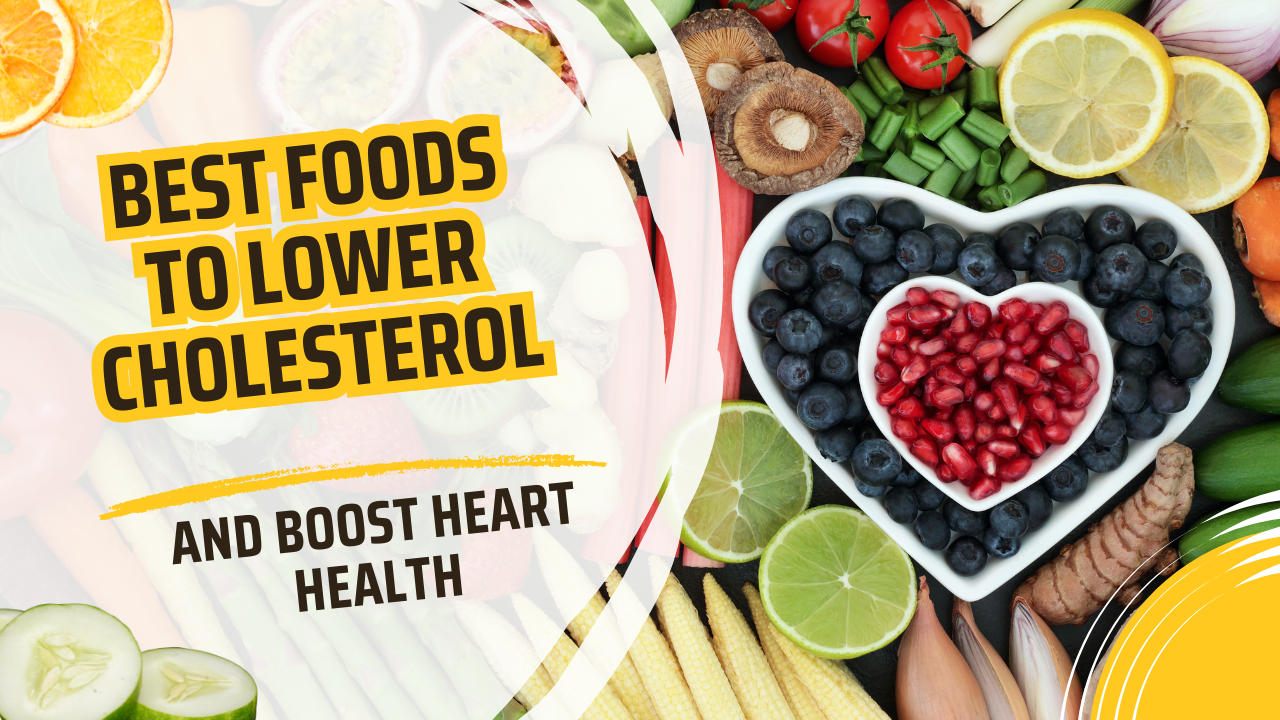High cholesterol is a serious health concern and one of the main contributors to heart disease, which continues to be the leading cause of death worldwide. When cholesterol levels rise, they can lead to clogged arteries, increasing the risk of heart attacks and strokes. However, the good news is that lifestyle changes—especially your diet—can play a powerful role in managing cholesterol.
Incorporating the right foods to lower cholesterol into your meals can make a significant difference. Fiber-rich foods like oats, beans, and lentils help reduce LDL (bad) cholesterol by preventing its absorption in the bloodstream. Healthy fats from sources like avocados, nuts, and olive oil also support heart health by increasing HDL (good) cholesterol.
Adding more plant-based meals and cutting down on processed and fried foods can improve your lipid profile over time. By choosing heart-friendly ingredients and sticking to a balanced diet, you can naturally manage cholesterol and boost overall cardiovascular wellness.
Understanding Cholesterol: The Basics
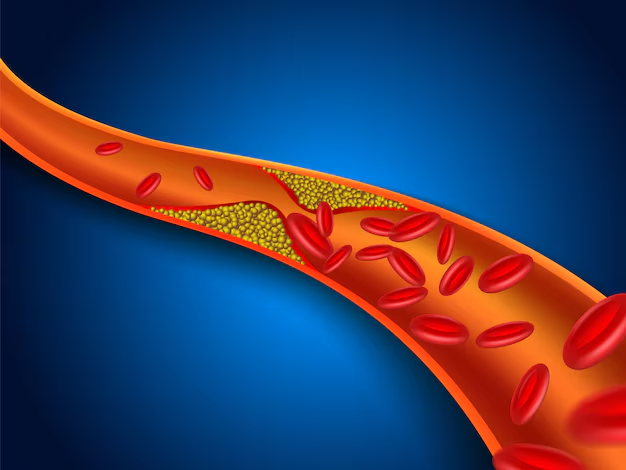
Cholesterol is a fat-like substance found in all cells of the body. It’s essential for producing hormones, vitamin D, and substances that help digest food. While your body needs cholesterol to function, too much of it—especially LDL (bad cholesterol)—can be harmful to your health.
When cholesterol levels become too high, it can lead to the buildup of plaque in the arteries. This narrows the blood vessels and increases the risk of heart disease, heart attacks, and strokes. That’s why managing cholesterol is crucial for long-term heart health.
One of the most effective ways to manage cholesterol is through diet. Including foods to lower cholesterol—such as oats, legumes, nuts, fatty fish, and fruits—can help reduce LDL levels naturally. Making these foods a regular part of your meals supports a healthy heart and lowers the risk of cardiovascular complications without the need for medication.
There are two main types of cholesterol:
LDL (Low-Density Lipoprotein) – Known as “bad” cholesterol, high levels of LDL can lead to plaque buildup in arteries.
HDL (High-Density Lipoprotein) – Known as “good” cholesterol, HDL helps remove LDL cholesterol from the bloodstream.
The goal is to lower LDL and raise HDL, and diet plays a crucial role in achieving that balance.
How Diet Influences Cholesterol Levels
Certain foods can significantly raise LDL (bad) cholesterol, especially those high in saturated fats, trans fats, and dietary cholesterol. Common culprits include processed meats, fried foods, full-fat dairy, and baked goods made with hydrogenated oils. Regular consumption of these items can increase your risk of heart disease.
On the other hand, choosing the right foods to lower cholesterol can greatly improve your heart health. Fiber-rich foods like oats, barley, and beans help reduce cholesterol absorption in the bloodstream. Healthy fats found in nuts, seeds, avocados, and olive oil can raise HDL (good) cholesterol while lowering LDL.
Let’s dive into the top 8 tips and cholesterol-lowering foods that can revolutionize your diet and well-being. By focusing on whole, nutrient-dense ingredients, you can naturally manage your cholesterol levels and support long-term cardiovascular health—without relying solely on medication. A few smart dietary swaps can truly make a life-changing difference.
Top Tips and Foods to Lower Cholesterol Naturally
Oats and Whole Grains – The Fiber Powerhouse
Oats are among the most effective foods to lower cholesterol naturally. They are packed with soluble fiber, especially a type called beta-glucan, which binds to cholesterol in the digestive system and helps eliminate it from the body. This process reduces the overall absorption of LDL (bad) cholesterol into your bloodstream.
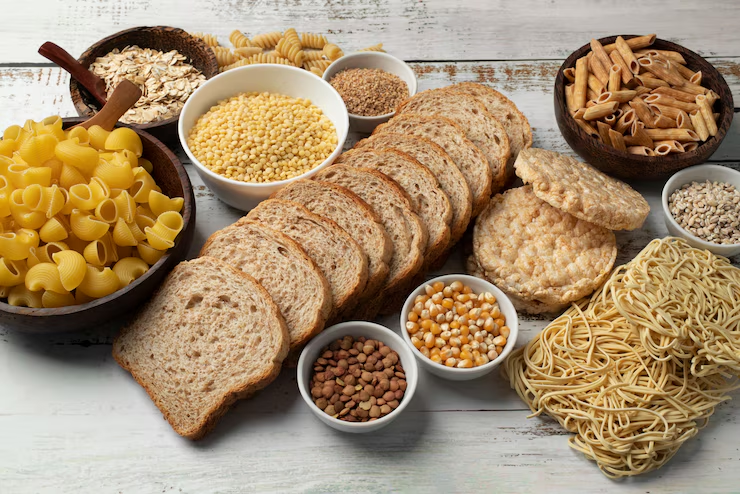
Eating just 5 to 10 grams of soluble fiber daily from oats can make a noticeable difference in your cholesterol levels. A bowl of oatmeal for breakfast or adding oat bran to smoothies, soups, or baked goods is an easy and tasty way to include this heart-healthy grain in your diet.
Incorporating oats regularly can improve not only cholesterol levels but also digestive health and satiety. As part of a balanced diet rich in foods to lower cholesterol, oats offer a simple and effective strategy for protecting your heart and supporting overall wellness.
How to include in your diet:
Start your day with a bowl of oatmeal.
Add oat bran to smoothies or baked goods.
Swap refined grains for whole grains like brown rice, barley, and quinoa.
Serving suggestion: A bowl of oatmeal topped with sliced bananas and flaxseeds can provide about 4 grams of soluble fiber.
Fatty Fish – Omega-3 for the Win
Fatty fish such as salmon, mackerel, and sardines are excellent foods to lower cholesterol and support heart health. These fish are rich in omega-3 fatty acids, which have been shown to reduce triglyceride levels, raise HDL (good) cholesterol, and decrease overall inflammation in the body.
Unlike saturated fats found in red meat and processed foods, omega-3 fats help protect your arteries and improve blood flow. Eating fatty fish two to three times a week can significantly reduce your risk of heart disease while supporting healthy cholesterol levels naturally.
Grilled, baked, or steamed fish makes a delicious and heart-friendly addition to any diet. When combined with other foods to lower cholesterol, such as whole grains, fruits, and vegetables, fatty fish can be a key part of a balanced plan to reduce LDL levels and improve cardiovascular wellness.
How to include in your diet:
Eat at least two servings of fatty fish per week.
Grill, bake, or steam instead of frying.
Bonus tip: Replace red meat with fish to cut down on saturated fats, further helping reduce LDL.
Nuts – Crunchy Heart Helpers
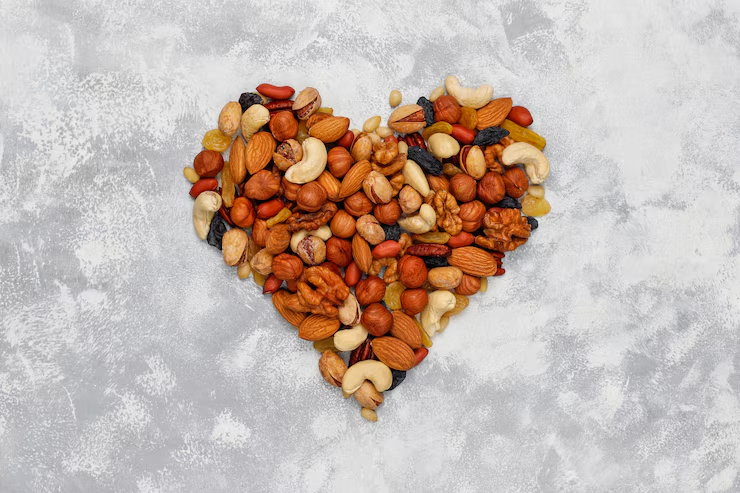
Nuts such as almonds, walnuts, and pistachios are nutrient-dense snacks and powerful foods to lower cholesterol. They are rich in heart-healthy unsaturated fats, which help reduce LDL (bad) cholesterol while maintaining or even raising HDL (good) cholesterol levels.
These nuts also provide fiber and plant sterols—natural compounds that block the absorption of cholesterol in the intestines. Regular consumption, even just a small handful per day, has been linked to improved lipid profiles and reduced risk of heart disease.
Adding nuts to your diet is easy and delicious. Enjoy them as a snack, toss them into salads, or mix them into oatmeal and yogurt. When paired with other foods to lower cholesterol, nuts offer a simple, satisfying, and natural way to protect your heart and support long-term cardiovascular health. Just be mindful of portion sizes, as nuts are also calorie-dense.
How to include in your diet:
Snack on a handful of unsalted mixed nuts.
Add chopped nuts to salads, yogurt, or oatmeal.
Watch your portions: Nuts are calorie-dense. Stick to 1 ounce (about a small handful) per serving.
Legumes and Beans – Plant-Based Protein Heroes
Beans, lentils, chickpeas, and peas are some of the most effective foods to lower cholesterol naturally. These legumes are rich in soluble fiber, which helps reduce the absorption of LDL (bad) cholesterol into the bloodstream by binding with it in the digestive tract.
In addition to fiber, legumes are packed with plant-based protein, making them excellent alternatives to red meat. Replacing animal protein with beans or lentils a few times a week can significantly lower cholesterol levels and reduce the risk of heart disease.
Versatile and budget-friendly, legumes can be added to soups, salads, stews, or served as a main dish. When combined with other foods to lower cholesterol, like whole grains and vegetables, legumes form a heart-healthy foundation for any diet. Their ability to support heart health while offering satisfying nutrition makes them a smart choice for cholesterol control.
How to include in your diet:
Use beans in soups, stews, salads, and dips like hummus.
Substitute beans for meat in tacos, burritos, or chili.
Serving tip: A cup of cooked lentils contains over 15 grams of fiber and plenty of plant-based protein.
Avocados – Creamy Good Fats
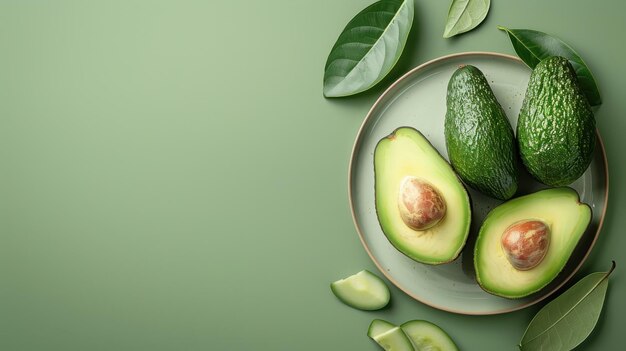
Avocados are a delicious and nutrient-rich addition to any heart-healthy diet. As one of the top foods to lower cholesterol, they are packed with monounsaturated fats, which help reduce LDL (bad) cholesterol while increasing HDL (good) cholesterol levels.
Beyond healthy fats, avocados also provide dietary fiber and plant sterols—two nutrients that play a key role in reducing cholesterol absorption in the intestines. Including just half an avocado a day can support better heart health and improved lipid profiles.
You can enjoy avocados sliced on whole-grain toast, blended into smoothies, or added to salads and wraps. When paired with other foods to lower cholesterol, like nuts, legumes, and fatty fish, avocados become part of a powerful dietary strategy for naturally managing cholesterol and supporting long-term cardiovascular wellness.
How to include in your diet:
Spread avocado on whole-grain toast.
Add slices to salads or smoothies.
Use as a creamy base for dressings or dips.
Nutritional note: One avocado a day can significantly improve your lipid profile.
Fruits and Vegetables – Nature’s Medicine Cabinet
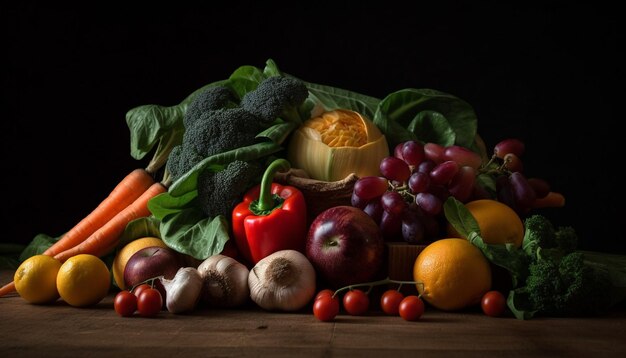
Fruits and vegetables are essential foods to lower cholesterol and support overall heart health. They are naturally low in calories and saturated fats, making them ideal for weight management and reducing cardiovascular risk. Their rich nutrient profile contributes to better cholesterol control.
These plant-based foods are high in dietary fiber, which helps lower LDL (bad) cholesterol by binding to it and removing it from the body. They also contain antioxidants and phytochemicals that protect blood vessels, reduce inflammation, and improve overall cholesterol levels.
Including a variety of colorful fruits and vegetables in your daily meals—like berries, apples, leafy greens, carrots, and broccoli—can significantly enhance heart health. When combined with other foods to lower cholesterol, they form the foundation of a heart-healthy diet that’s both nourishing and naturally effective in lowering cholesterol.
Top picks:
Apples, berries, oranges, and grapes (contain pectin, a type of soluble fiber).
Leafy greens like kale and spinach (rich in lutein and fiber).
How to include in your diet:
Fill half your plate with vegetables at each meal.
Snack on fruit instead of processed treats.
Olive Oil – Liquid Gold for Heart Health
Olive oil, particularly extra virgin olive oil, is one of the healthiest foods to lower cholesterol. It’s rich in monounsaturated fats, which help reduce LDL (bad) cholesterol while maintaining or even boosting HDL (good) cholesterol levels, supporting better heart health.
This oil also contains powerful antioxidants, including polyphenols, which protect blood vessels and reduce oxidative stress—a key factor in the development of heart disease. Using olive oil in place of butter or other saturated fats is a smart way to promote healthy cholesterol levels.
Incorporate extra virgin olive oil into your meals by drizzling it over salads, vegetables, or using it for light cooking. When combined with other foods to lower cholesterol, such as whole grains, legumes, and leafy greens, olive oil becomes an essential part of a heart-friendly diet that’s both flavorful and effective.
How to include in your diet:
Use olive oil for sautéing or roasting vegetables.
Make salad dressings with olive oil, lemon, and herbs.
Drizzle over cooked grains or pasta.
Tip: Replace butter or margarine with olive oil wherever possible.
Foods Fortified with Plant Sterols and Stanols
Plant sterols and stanols are natural compounds found in small amounts in fruits, vegetables, nuts, and seeds. These powerful substances are recognized as effective foods to lower cholesterol because they block the absorption of LDL (bad) cholesterol in the intestines, helping to reduce its levels in the bloodstream.
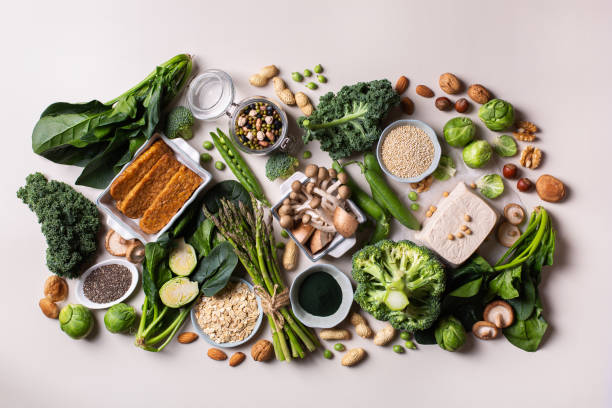
When consumed regularly, plant sterols and stanols can lower LDL cholesterol by up to 10% without affecting HDL (good) cholesterol. They are often added to fortified foods like margarine spreads, orange juice, and yogurt drinks, making it easier to include them in your daily diet.
To get the cholesterol-lowering benefits, aim for about 2 grams of sterols or stanols per day. Pairing these with other foods to lower cholesterol, such as oats, legumes, and healthy fats, creates a comprehensive approach to managing cholesterol levels and improving heart health naturally.
Sources include:
Fortified orange juice
Fortified margarine spreads
Supplements or fortified yogurt
Recommended intake: 2 grams per day can lower LDL cholesterol by about 10%.
Other Cholesterol- Lowering Strategies
While including foods to lower cholesterol is essential, combining them with smart lifestyle changes can significantly improve your heart health.
Limit saturated and trans fats by avoiding red meat, full-fat dairy, fried foods, and processed snacks. These unhealthy fats raise LDL (bad) cholesterol and increase the risk of heart disease. Replace them with healthier fat sources like nuts, avocados, and olive oil.
Exercise regularly, especially with aerobic activities like brisk walking, swimming, or cycling. Regular movement helps raise HDL (good) cholesterol and supports overall cardiovascular health, especially when paired with foods to lower cholesterol.
Avoid smoking and limit alcohol consumption, These habits can reduce HDL levels and elevate LDL, negatively impacting cholesterol balance and artery health.

Maintain a healthy weight, Losing even 5–10% of your body weight can lead to a noticeable drop in LDL cholesterol. Combined with a diet rich in foods to lower cholesterol, this forms a powerful strategy for heart health.
Sample One-Day Cholesterol-Lowering Meal Plan
Here’s your cholesterol-lowering meal plan in a clear table format:
| Meal | Menu |
|---|---|
| Breakfast | Oatmeal with blueberries, ground flaxseed, and almond milk Green tea |
| Snack | Apple with a handful of walnuts |
| Lunch | Lentil soup Spinach and avocado salad with olive oil dressing Whole grain toast |
| Snack | Low-fat yogurt with sliced strawberries |
| Dinner | Grilled salmon Quinoa and roasted vegetables Steamed broccoli with lemon |
| Dessert (Optional) | Fresh fruit bowl or a square of dark chocolate (70%+ cocoa) |
This plan is rich in foods to lower cholesterol, combining fiber, healthy fats, and plant-based nutrients for optimal heart health.
Supplements That May Help
While a diet rich in foods to lower cholesterol should always be the foundation, certain supplements may provide additional support when used correctly and under medical supervision.
Psyllium husk is a soluble fiber supplement that can help lower LDL (bad) cholesterol by binding to it in the digestive tract and promoting its removal from the body.
Fish oil is rich in omega-3 fatty acids, which are effective in reducing triglyceride levels and supporting overall heart health when paired with foods to lower cholesterol in your daily meals.
Plant sterols, available in pill or chewable form, work by blocking cholesterol absorption in the intestines and are often recommended for people with high LDL levels.
Remember, supplements can support your efforts, but they should not replace a heart-healthy diet. Always consult your doctor before adding any supplement to your routine, especially if you’re managing cholesterol or taking medications.
Common Myths About Cholesterol and Diet
Myth 1: Eggs are bad for you
Modern research shows that, for most people, moderate egg consumption does not significantly raise blood cholesterol. Eggs can be part of a balanced diet that includes plenty of foods to lower cholesterol, such as oats, fruits, and vegetables.
Myth 2: All fats are harmful
Not all fats are created equal. Healthy fats from nuts, seeds, avocados, and fatty fish can actually improve cholesterol levels. These are key foods to lower cholesterol and support heart health when used in place of saturated and trans fats.
Myth 3: You need to cut all cholesterol-containing foods
It’s no longer necessary to eliminate foods like shrimp or eggs. Dietary cholesterol has less impact on blood levels than once believed. Instead, focus on reducing saturated and trans fats while increasing fiber-rich and plant-based foods to lower cholesterol.
Conclusion
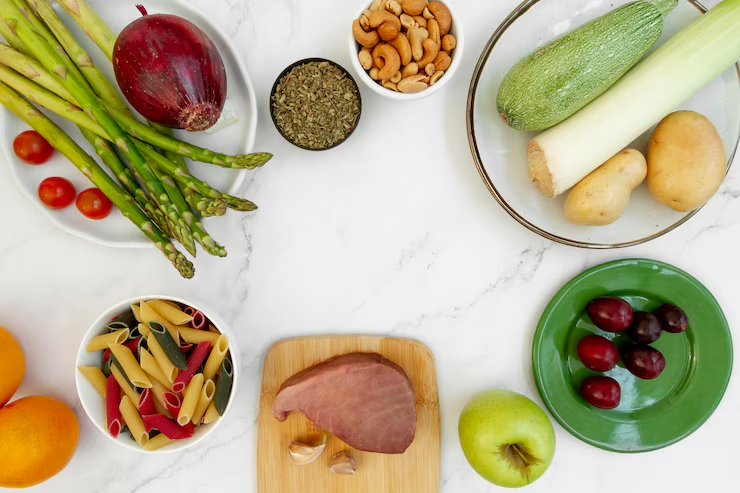
Cholesterol doesn’t have to control your life. With the right lifestyle and food choices, you can take charge of your heart health. One of the most effective strategies is adopting a diet rich in whole, plant-based ingredients and heart-healthy fats. This not only improves your cholesterol levels but also supports overall wellness and reduces the risk of cardiovascular disease.
Focusing on foods to lower cholesterol—such as oats, fatty fish, nuts, legumes, and avocados—can make a real difference. These nutrient-dense options help reduce LDL (bad) cholesterol while increasing HDL (good) cholesterol. They also provide essential fiber, healthy fats, and antioxidants that promote a strong, healthy heart.
The foods to lower cholesterol we’ve discussed—oats, fatty fish, nuts, legumes, avocados, fruits and vegetables, olive oil, and plant sterols—aren’t just smart choices; they’re powerful tools. Incorporating them into your daily routine is a natural, sustainable way to support long-term vitality and heart health.
Here are 5 FAQs with the keyword Foods to Lower Cholesterol:
Q.1 What are the best foods to lower cholesterol naturally?
Some of the top foods to lower cholesterol include oats, beans, lentils, fatty fish, nuts, avocados, fruits, vegetables, olive oil, and plant sterols. These foods help reduce LDL (bad cholesterol) and support heart health.
Q.2 How quickly can foods to lower cholesterol show results?
With consistent dietary changes, including foods to lower cholesterol, you may begin to see improvements in your cholesterol levels within 4 to 6 weeks. However, results can vary based on overall lifestyle and health condition.
Q.3 Can I eat eggs while following a diet with foods to lower cholesterol?
Yes, moderate egg consumption is generally safe. Focus more on reducing saturated and trans fats and adding foods to lower cholesterol like fiber-rich grains and healthy fats.
Q.4 Are plant-based diets effective for lowering cholesterol?
Absolutely. Plant-based diets are naturally high in foods to lower cholesterol, including legumes, whole grains, fruits, vegetables, and nuts, which are known to support heart health.
Q.5 Do I need to avoid all fats to reduce cholesterol?
No, only unhealthy fats like trans and excessive saturated fats. Healthy fats found in foods to lower cholesterol such as olive oil, nuts, and avocados are beneficial and support good cholesterol (HDL) levels.

